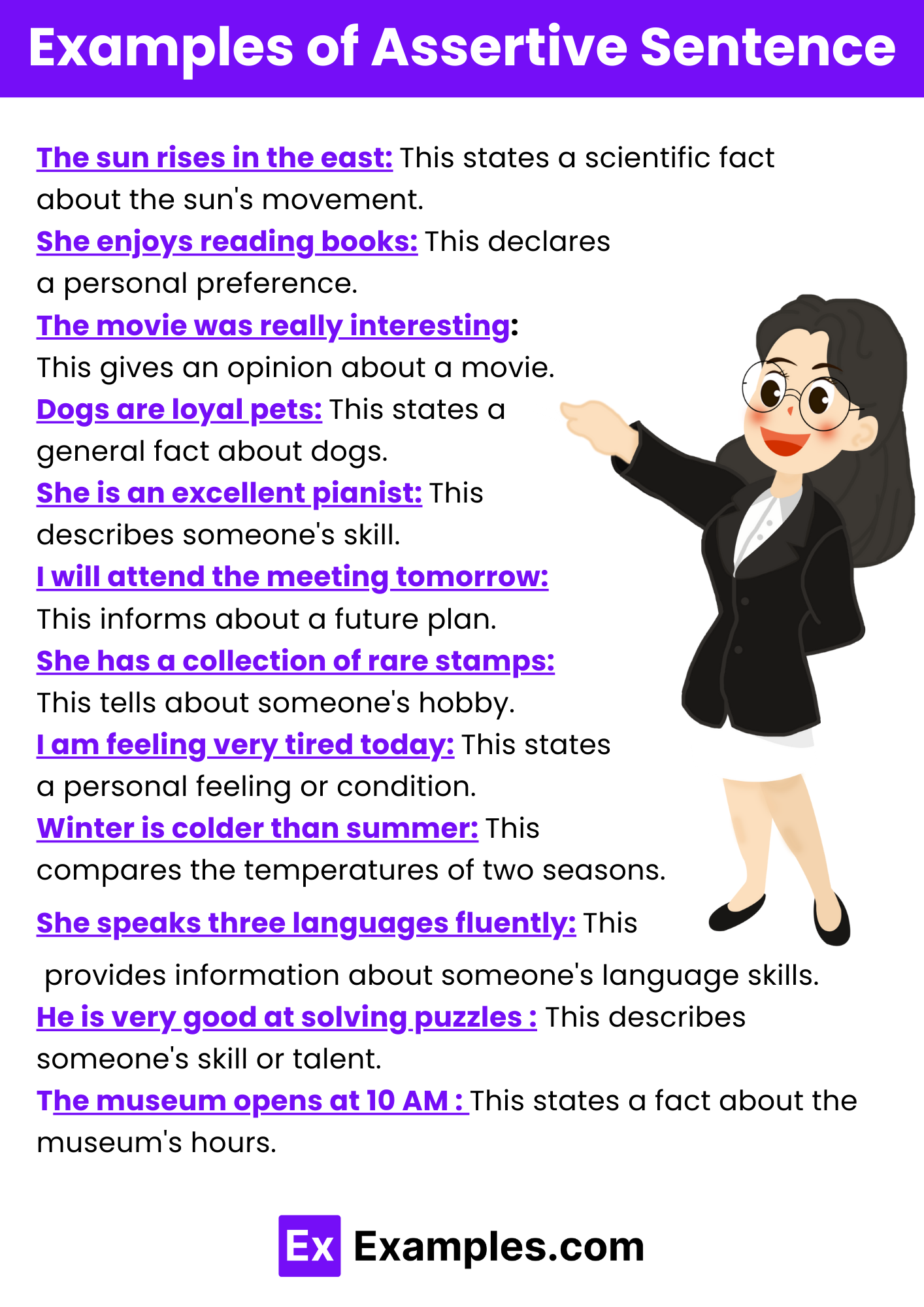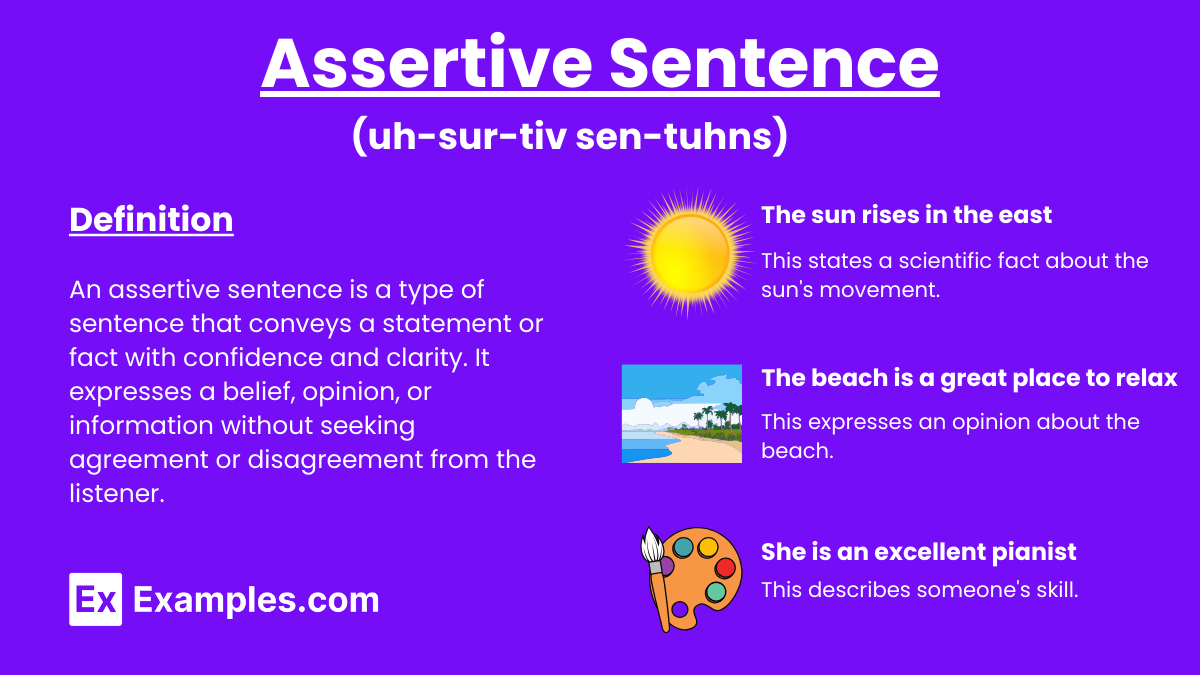50+ Assertive Sentence Examples
An assertive sentence, also known as a declarative sentence, states a fact, provides information, or makes a statement. It ends with a period and is one of the most common types of sentences in English. Assertive sentences can be positive (affirmative) or negative.
What is Assertive Sentence ?
50 Assertive Sentence Examples with Answers

- The sun rises in the east : This states a scientific fact about the sun’s movement.
- She enjoys reading books : This declares a personal preference.
- Water freezes at 0 degrees Celsius : This provides a factual statement about water’s freezing point.
- He is the captain of the football team : This specifies someone’s role in the team.
- The Earth revolves around the sun : This asserts a scientific fact about the Earth’s orbit.
- They are going to the market : This informs about someone’s current plan or action.
- She speaks three languages fluently : This provides information about someone’s language skills.
- The sky is blue on clear days : This describes a common observation about the sky.
- I am feeling very tired today : This states a personal feeling or condition.
- He works at a software company : This tells about someone’s employment.
- My favorite color is blue : This expresses a personal preference.
- They moved to a new house last month : This provides information about a recent action.
- The library closes at 6 PM : This states a fact about the library’s hours.
- She loves to paint landscapes : This declares someone’s interest or hobby.
- I will attend the meeting tomorrow : This informs about a future plan.
- The movie was really interesting : This gives an opinion about a movie.
- Dogs are loyal pets : This states a general fact about dogs.
- He has visited three different countries : This provides information about someone’s travel experiences.
- Winter is colder than summer : This compares the temperatures of two seasons.
- She baked a cake for her friend’s birthday : This tells about a specific action someone took.
- The book is on the table : This specifies the location of an object.
- He drives a red car : This gives information about someone’s car.
- We had pasta for dinner last night : This provides information about a past meal.
- The park is very crowded today : This describes the current state of the park.
- She won the first prize in the competition : This informs about someone’s achievement.
- I enjoy hiking in the mountains : This expresses a personal interest or hobby.
- The conference starts at 9 AM : This states a fact about the timing of an event.
- He always helps his neighbors : This describes someone’s regular behavior.
- The restaurant serves delicious food : This gives an opinion about the quality of food in a restaurant.
- I read the newspaper every morning : This tells about a daily routine.
- She is an excellent pianist : This describes someone’s skill.
- We are planning a trip to Paris next summer : This informs about future travel plans.
- He completed his homework before dinner : This provides information about the timing of an action.
- The flowers in the garden are blooming beautifully : This describes the state of the flowers.
- I believe in the importance of education : This expresses a personal belief or value.
- She practices yoga every morning : This tells about a regular activity someone does.
- The new mall has many stores : This provides information about the number of stores in a mall.
- He enjoys listening to classical music : This declares someone’s musical preference.
- The children are playing in the park : This describes a current activity of the children.
- She has a collection of rare stamps : This tells about someone’s hobby.
- I finished reading the book last night : This provides information about completing an activity.
- The city is known for its beautiful architecture : This states a fact about the city’s reputation.
- He is very good at solving puzzles : This describes someone’s skill or talent.
- We watched a fascinating documentary : This gives an opinion about a documentary.
- The museum opens at 10 AM : This states a fact about the museum’s hours.
- She drinks a cup of tea every evening : This tells about a daily habit.
- I learned a lot from the workshop : This provides information about the outcome of an event.
- The beach is a great place to relax : This expresses an opinion about the beach.
- He enjoys playing basketball with his friends : This declares someone’s recreational activity.
- We are excited about the upcoming concert : This expresses a feeling of anticipation about an event.
Assertive Sentence Examples for Kids
- I finished my homework before dinner : The speaker completed their homework before dinner.
- I cleaned my room all by myself : The speaker tidied up their room without any help.
- I planted a seed in the garden today : Fantastic! You’re helping nature by planting seeds and watching them grow.
- I scored a goal in soccer practice : “Yes, I kicked the ball into the goal during our soccer practice.”
- The cake tastes delicious : This is an affirmative assertive sentence giving an opinion about the taste of the cake.
Positive Assertive Sentence Examples
- I am capable of achieving my goals : Yes, you can reach your goals! Believe in yourself and keep going.
- I believe in myself and my abilities : That’s great! Trusting yourself is important.
- I deserve success, and I will work hard to attain it : You do deserve success. Keep working hard and you will get there.
- I am confident in my decisions and choices : Good! Being sure about your decisions helps you grow.
- I am worthy of love and respect : Absolutely! Everyone deserves love and respect, including you.
Easy Assertive Sentence Examples
- I can solve this problem : Yes, you can! Keep trying and you’ll find the solution.
- I will finish my homework before dinner : Good idea! Stay focused and you’ll get it done.
- I know the answer to that question : Great! Share your answer confidently.
- I am going to the store to buy some groceries : Sounds good. Make sure to get everything you need.
- I enjoy spending time with my friends : That’s wonderful! Enjoy your time together.
Imperative Assertive Sentence Examples
1. Using a Conjunction
- Imperative: Listen to the instructions.
- Assertive: They are very important.
- Combined: Listen to the instructions because they are very important.
2. Sequential Actions
- Imperative: Start the car.
- Assertive: We need to leave now.
- Combined: Start the car; we need to leave now.
3. Conditional Statements
- Imperative: Eat your vegetables.
- Assertive: You will grow strong and healthy.
- Combined: Eat your vegetables if you want to grow strong and healthy.
4. Cause and Effect
- Imperative: Turn off the lights.
- Assertive: We should save electricity.
- Combined: Turn off the lights so we can save electricity.
5. Contrast
- Imperative: Try your best.
- Assertive: The outcome doesn’t matter as much.
- Combined: Try your best, but remember the outcome doesn’t matter as much.
Types of Assertive Sentences
1. Positive Assertive Sentences
Positive assertive sentences make a statement about something that is true or affirmative.
Examples:
- She loves reading books.
- The sun rises in the east.
- He is a talented musician.
2. Negative Assertive Sentences
Negative assertive sentences make a statement that denies or negates something.
Examples:
- She does not like broccoli.
- They are not coming to the party.
- The store isn’t open on Sundays.
3. Simple Assertive Sentences
Simple assertive sentences contain a single clause, expressing a complete thought.
Examples:
- The cat is sleeping.
- He runs every morning.
- They play soccer on weekends.
4. Compound Assertive Sentences
Compound assertive sentences contain two or more independent clauses, usually joined by conjunctions like “and,” “but,” or “or.”
Examples:
- She finished her homework, and he started his project.
- The weather was bad, but they went hiking anyway.
- He can come to the meeting, or he can send a representative.
5. Complex Assertive Sentences
Complex assertive sentences contain one independent clause and at least one dependent clause.
Examples:
- Although it was raining, they continued their journey.
- She will pass the exam if she studies hard.
- He left the party early because he was tired.
6. Interrogative Assertive Sentences
Interrogative assertive sentences are statements turned into questions, often using a rising intonation.
Examples:
- You are coming to the meeting, aren’t you?
- She likes coffee, doesn’t she?
- It’s a beautiful day, isn’t it?
How to use Assertive in a sentences
Structure of Assertive Sentences
An assertive sentence typically follows this structure:
Subject + Predicate
Subject: The person, place, thing, or idea that is doing or being something.
Predicate: The part of the sentence that tells something about the subject.
How to Use Assertive Sentences in Different Contexts
1. Daily Communication
Talking about routine: I wake up at 6 AM every day.
Describing activities: We go to the gym every evening.
2. Academic Writing
Presenting information: The experiment showed significant results.
Stating arguments: Climate change is a pressing global issue.
3. Professional Communication
Providing updates: The project will be completed by Friday.
Giving instructions: All employees must attend the meeting.
4. Creative Writing
Setting a scene: The sun set over the mountains, casting a golden glow.
Developing characters: John was a man of few words, but his actions spoke volumes.
Tips for Using Assertive Sentences
- Be Clear and Direct
- Use Proper Punctuation
- Stay Relevant to the Topic
- Use Simple Language
- Vary Sentence Length
- Use Conjunctions to Combine Ideas
- Be Confident
- Provide Necessary Details
- Use Positive Statements
- Ensure Subject-Verb Agreement
How do assertive sentences function in English?
Assertive sentences provide information, describe situations, or express thoughts and beliefs, making up the majority of sentences in English.
What is the structure of an assertive sentence?
An assertive sentence typically follows a subject-verb-object structure.
What is the difference between assertive and interrogative sentences?
Assertive sentences state facts; interrogative sentences ask questions.
How do assertive sentences help in communication?
They clearly convey information, making communication efficient and effective.
How can assertive sentences show emphasis?
Use adverbs or phrases for emphasis, e.g., “He absolutely loves reading.”
Do assertive sentences need punctuation?
Yes, assertive sentences end with a period.
Are assertive sentences used in both spoken and written English?
Yes, they are essential in both spoken and written communication.
Can an assertive sentence be a single word?
Rarely, as it usually requires a subject and predicate to convey a complete idea.
Can assertive sentences be compound sentences?
Yes, compound assertive sentences join two independent clauses with conjunctions like “and” or “but.”
How do assertive sentences enhance writing clarity?
They provide clear and direct information, helping readers understand the writer’s points and ideas easily.



